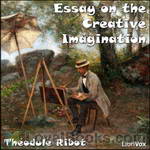|
Books Should Be Free Loyal Books Free Public Domain Audiobooks & eBook Downloads |
|
|
Books Should Be Free Loyal Books Free Public Domain Audiobooks & eBook Downloads |
|
Philosophy Books |
|---|
|
Book type:
Sort by:
View by:
|
By: Théodule Ribot (1839-1916) | |
|---|---|
 Essay on the Creative Imagination
Essay on the Creative Imagination
“It is quite generally recognized that psychology has remained in the semi-mythological, semi-scholastic period longer than most attempts at scientific formulization. For a long time it has been the “spook science” per se, and the imagination, now analyzed by M. Ribot in such a masterly manner, has been one of the most persistent, apparently real, though very indefinite, of psychological spooks. Whereas people have been accustomed to speak of the imagination as an entity sui generis, as a... | |
By: Thomas Browne | |
|---|---|
 Religio Medici and Hydriotaphia
Religio Medici and Hydriotaphia
Religio Medici (The Religion of a Doctor) sets out Sir Thomas Browne's spiritual testament as well as being an early psychological self-portrait. In its day, the book was a European best-seller. It was published in 1643 by the newly-qualified physician, and its unorthodox views placed it swiftly upon the Papal Index Librorum Prohibitorum in 1645. Although predominantly concerned with Christian faith, the Religio also meanders into digressions upon alchemy, hermetic philosophy, astrology, and physiognomy... | |
By: Thomas Ellwood (1639-1714?) | |
|---|---|
 The History of Thomas Ellwood Written By Himself
The History of Thomas Ellwood Written By Himself
| |
By: Thomas H. Burgoyne (1855-1894) | |
|---|---|
 The Light of Egypt, vol II
The Light of Egypt, vol II
"The Light of Egypt" will be found to be an Occult library in itself, a textbook of esoteric knowledge, setting forth the "wisdom Religion" of life, as taught by the Adepts of Hermetic Philosophy. It will richly repay all who are seeking the higher life to carefully study this book, as it contains in a nutshell the wisdom of the ages regarding man and his destiny, here and hereafter. The London and American first edition, also the French edition, Vol. I, met with lively criticism from Blavatsky Theosophists, because it annihilates that agreeable delusion of "Karma" and "Reincarnation" from the minds of all lovers of truth for truth's sake. | |
By: Thomas Henry Huxley (1825-1895) | |
|---|---|
 Evolution and Ethics
Evolution and Ethics
| |
 Hume (English Men of Letters Series)
Hume (English Men of Letters Series)
| |
 Lay Sermons, Addresses and Reviews
Lay Sermons, Addresses and Reviews
| |
By: Thomas Hobbes (1588-1679) | |
|---|---|
 Leviathan, or The Matter, Forme and Power of a Common Wealth Ecclesiasticall and Civil
Leviathan, or The Matter, Forme and Power of a Common Wealth Ecclesiasticall and Civil
Books 1 and 2. Leviathan, or The Matter, Forme and Power of a Common Wealth Ecclesiasticall and Civil is a book written in 1651 by Thomas Hobbes. The book concerns the structure of society (as represented figuratively by the frontispiece, showing the state giant made up of individuals). In the book, Hobbes argues for a social contract and rule by a sovereign. Influenced by the English Civil War, Hobbes wrote that chaos or civil war – situations identified with a state of nature and the famous motto bellum omnium contra omnes (”the war of all against all”) – could only be averted by strong central government... | |
By: Thomas Love Peacock (1785-1866) | |
|---|---|
 Crotchet Castle
Crotchet Castle
| |
By: Thomas R. Malthus (1766-1834) | |
|---|---|
 An Essay on the Principle of Population
An Essay on the Principle of Population
The power of population is indefinitely greater than the power in the earth to produce subsistence for man. Population, when unchecked, increases in a geometrical ratio. Subsistence increases only in an arithmetical ratio. A slight acquaintance with numbers will show the immensity of the first power in comparison with the second (Malthus). | |
By: Thomas Troward (1847-1916) | |
|---|---|
 The Edinburgh Lectures on Mental Science
The Edinburgh Lectures on Mental Science
Thomas Troward was a divisional Judge in British-administered India. His avocation was the study of comparative religion. Influences on his thinking, as well as his later writing, included the teachings of Christ, Islam, Hinduism, and Buddhism. After his retirement from the judiciary in 1896, Troward set out to apply logic and a judicial weighing of evidence in the study of matters of cause and effect. The philosopher William James characterized Troward’s Edinburgh Lectures on Mental Science as "far and away the ablest statement of philosophy I have met, beautiful in its sustained clearness of thought and style, a really classic statement... | |
 The Doré Lectures being Sunday addresses at the Doré Gallery, London, given in connection with the Higher Thought Centre
The Doré Lectures being Sunday addresses at the Doré Gallery, London, given in connection with the Higher Thought Centre
| |
By: Tito Vignoli (1828-1914) | |
|---|---|
 Myth and Science An Essay
Myth and Science An Essay
| |
By: Unknown | |
|---|---|
 The Dhammapada
The Dhammapada
The Dhammapada is is a Buddhist scripture, containing 423 verses in 26 categories. According to tradition, these are verses spoken by the Buddha on various occasions, most of which deal with ethics. It is is considered one of the most important pieces of Theravada literature. Despite this, the Dhammapada is read by many Mahayana Buddhists and remains a very popular text across all schools of Buddhism. – Excerpted from Wikipedia | |
 Oscar Wilde: Art and Morality. A Defence of The Picture of Dorian Gray
Oscar Wilde: Art and Morality. A Defence of The Picture of Dorian Gray
“Who can help laughing when an ordinary journalist seriously proposes to limit the subject-matter at the disposal of the artist?” “We are dominated by journalism…. Journalism governs for ever and ever.” One of the nastiest of the British tabloids was founded a year too late to join in the moral panic generated to accompany Oscar Wilde’s court appearances in 1895. Yet there was no shortage of hypocritical journalists posing as moral arbiters to the nation, then as now. This compendium... | |
 Apology, Crito, and Phaedo of Socrates
Apology, Crito, and Phaedo of Socrates
| |
 Voltaire's Philosophical Dictionary
Voltaire's Philosophical Dictionary
| |
 The Categories
The Categories
| |
 Plutarch's Morals
Plutarch's Morals
| |
 The Laws of Etiquette
The Laws of Etiquette
| |
 Cratylus
Cratylus
Cratylus (ΚΡΑΤΥΛΟΣ) discusses whether things have names by mere convention or have true names which can only be correctly applied to the object named and may have originated from God. | |
 A Philosophical Dictionary, Volume 1
A Philosophical Dictionary, Volume 1
| |
 Philebus
Philebus
Philebus (ΦΙΛΗΒΟΣ) discusses pleasure, wisdom, soul and God. | |
 An Essay on the Beautiful From the Greek of Plotinus
An Essay on the Beautiful From the Greek of Plotinus
| |
 A Jolly by Josh
A Jolly by Josh
| |
 A Philosophical Dictionary, Volume 9
A Philosophical Dictionary, Volume 9
| |
By: Various (1833-1884) | |
|---|---|
 John Stuart Mill; His Life and Works
John Stuart Mill; His Life and Works
This biography is actually a series of essays by prominent personalities of the time that shed light on John Stuart Mill's life and areas of endeavor. Those areas include his experiences in India House, his moral character, certain botanical explorations, how effective he was as a critic, studies in morals and the law, and discoveries concerning political economy. They also explore ideas concerning his influence on institutions of higher learning, accomplishments as a politician, and fame as a philosopher. | |
By: Vernon Lee (1856-1935) | |
|---|---|
 The Beautiful An Introduction to Psychological Aesthetics
The Beautiful An Introduction to Psychological Aesthetics
| |
By: Victor Mapes (1870-1943) | |
|---|---|
 Heart and Soul by Maveric Post
Heart and Soul by Maveric Post
| |
By: Voltaire (1694-1778) | |
|---|---|
 Zadig, or the Book of Fate
Zadig, or the Book of Fate
Zadig, ou La Destinée, (”Zadig, or The Book of Fate”) (1747) is a famous novel written by the French Enlightenment philosopher Voltaire. It tells the story of Zadig, a philosopher in ancient Babylonia. The author does not attempt any historical accuracy, and some of the problems Zadig faces are thinly disguised references to social and political problems of Voltaire’s own day. The book is philosophical in nature, and presents human life as in the hands of a destiny beyond human control. It is a story of religious and metaphysical orthodoxy, both of which Voltaire challenges with his presentation of the moral revolution taking place in Zadig himself... | |
By: W. R. Washington (William Robert Washington) Sullivan | |
|---|---|
 Morality as a Religion An exposition of some first principles
Morality as a Religion An exposition of some first principles
| |
By: W. Tudor (William Tudor) Jones (1865-1946) | |
|---|---|
 An Interpretation of Rudolf Eucken's Philosophy
An Interpretation of Rudolf Eucken's Philosophy
| |
By: Walt Whitman (1819-1892) | |
|---|---|
 Leaves of Grass
Leaves of Grass
Nearly 160 years after it was first published, Walt Whitman's Leaves of Grass continues to inspire, enthrall and educate generations of readers. This collection of poems serves as a vehicle for Whitman's philosophy, ideals, love of nature and mystical musings and it subsequently became one of the corner stones of American literature. Whitman was inspired to write Leaves of Grass based on Ralph Waldo Emerson's clarion call for a truly American poet who would tell of its glories, virtues and vices... | |
By: Walter Cox Green | |
|---|---|
 The Book of Good Manners; a Guide to Polite Usage for All Social Functions
The Book of Good Manners; a Guide to Polite Usage for All Social Functions
| |
By: Walter Germain | |
|---|---|
 The Complete Bachelor Manners for Men
The Complete Bachelor Manners for Men
| |
By: Walter Pater (1839-1896) | |
|---|---|
 Marius the Epicurean
Marius the Epicurean
Marius the Epicurean is a philosophical novel written by Walter Pater, published in 1885. In it Pater displays, with fullness and elaboration, his ideal of the aesthetic life, his cult of beauty as opposed to bare asceticism, and his theory of the stimulating effect of the pursuit of beauty as an ideal of its own. The principles of what would be known as the Aesthetic movement were partly traceable to this book; and its impact was particularly felt on one of the movement’s leading proponents, Oscar Wilde, a former student of Pater at Oxford. | |
 Plato and Platonism
Plato and Platonism
| |
By: Walter Rauschenbusch (1861-1918) | |
|---|---|
 The Social Principles of Jesus
The Social Principles of Jesus
| |
By: Willard E. (Willard Eugene) Hotchkiss (1874-) | |
|---|---|
 Higher Education and Business Standards
Higher Education and Business Standards
| |
By: William A Alcott (1798-1859) | |
|---|---|
 Young Woman's Guide to Excellence
Young Woman's Guide to Excellence
Much of this guide for young women is still valuable today. Despite mentions of tight lacing and other out of date matters, it contains many timeless principles. (Bria Snow) | |
By: William A. Alcott (1798-1859) | |
|---|---|
 The Young Man's Guide
The Young Man's Guide
| |
By: William Crosbie Hunter (1866-) | |
|---|---|
 Evening Round Up More Good Stuff Like Pep
Evening Round Up More Good Stuff Like Pep
| |
By: William De Witt Hyde (1858-1917) | |
|---|---|
 Practical Ethics
Practical Ethics
| |
By: William Edward Hartpole Lecky (1838-1903) | |
|---|---|
 The Map of Life Conduct and Character
The Map of Life Conduct and Character
| |
By: William George Jordan (1864-1928) | |
|---|---|
 The Majesty of Calmness
The Majesty of Calmness
Change your life by changing your thoughts. The Majesty of Calmness is your guide to attracting prosperity, manifesting opportunities, and managing stress–all while discovering the values most precious to you. | |
By: William Godwin (1756-1836) | |
|---|---|
 Thoughts on Man, His Nature, Productions and Discoveries
Thoughts on Man, His Nature, Productions and Discoveries
| |
By: William Graham Sumner (1840-1910) | |
|---|---|
 What Social Classes Owe to Each Other
What Social Classes Owe to Each Other
| |
By: William H. (William Howard) Taft (1857-1930) | |
|---|---|
 Ethics in Service
Ethics in Service
| |
By: William H. Mallock (1849-1923) | |
|---|---|
 Is Life Worth Living?
Is Life Worth Living?
| |
By: William Healy, Mary Healy | |
|---|---|
 Pathological Lying, Accusation, and Swindling – A Study in Forensic Psychology
Pathological Lying, Accusation, and Swindling – A Study in Forensic Psychology
This work describes and analyzes several cases of pathological behavior. The interest comes not only from the cases themselves, but also from the of-its-time analysis which is mired in what we now know to be wrong thinking about mental illness, sexuality, gender, and race. - written by Mary Schneider | |
By: William James (1842-1910) | |
|---|---|
 Essays in Radical Empiricism
Essays in Radical Empiricism
William James (1842 – 1910) was a pioneering American psychologist and philosopher. He wrote influential books on the young science of psychology, educational psychology, psychology of religious experience and mysticism, and the philosophies of pragmatism and Radical Empiricism. Essays in Radical Empiricism is a collection edited and published posthumously by his colleague and biographer Ralph Barton Perry in 1912. It was assembled from a collection of reprinted journal articles published from 1904–1905 which James had deposited in August 1906 at Harvard University, for supplemental use by his students. | |
 Varieties of Religious Experience
Varieties of Religious Experience
The Varieties of Religious Experience: A Study in Human Nature is a book by the Harvard psychologist and philosopher William James that comprises his edited Gifford Lectures on "Natural Theology" delivered at the University of Edinburgh in Scotland between 1901 and 1902. These lectures concerned the nature of religion and the neglect of science, in James' view, in the academic study of religion. Soon after its publication, the book found its way into the canon of psychology and philosophy, and has remained in print for over a century. | |
 Pragmatism
Pragmatism
'Pragmatism' contains a series of public lectures held by William James in Boston 1906–7. James provides a popularizing outline of his view of philosophical pragmatism while making highly rhetorical and entertaining lashes towards rationalism and other competing schools of thought. James is especially concerned with the pragmatic view of truth. True beliefs should be defined as, according to James, beliefs that can successfully assist people in their everday life. This is claimed to not be relativism... | |
 The Will to Believe : and Other Essays in Popular Philosophy
The Will to Believe : and Other Essays in Popular Philosophy
| |
 Meaning of Truth
Meaning of Truth
| |
 Memories and Studies
Memories and Studies
| |
By: William Jennings Bryan (1860-1925) | |
|---|---|
 The Price of a Soul
The Price of a Soul
| |
By: William Thomas Thornton (1813-1880) | |
|---|---|
 Old-Fashioned Ethics and Common-Sense Metaphysics With Some of Their Applications
Old-Fashioned Ethics and Common-Sense Metaphysics With Some of Their Applications
| |
By: William Walker Atkinson (1862-1932) | |
|---|---|
 Series of Lessons in Raja Yoga
Series of Lessons in Raja Yoga
The Book talks on the internal world of the self. The real nature of the subconscious mind, the way to control it, how ego comes into play and most frequently asked questions like "Who am I" are attempted to answer. | |
By: Winfield Scott Hall (1861-) | |
|---|---|
 The Biology, Physiology and Sociology of Reproduction Also Sexual Hygiene with Special Reference to the Male
The Biology, Physiology and Sociology of Reproduction Also Sexual Hygiene with Special Reference to the Male
| |